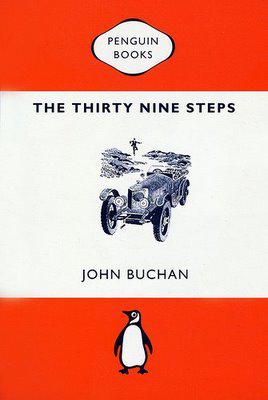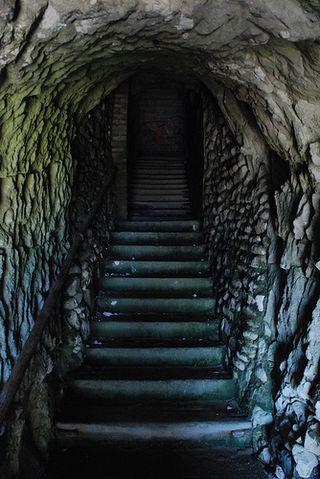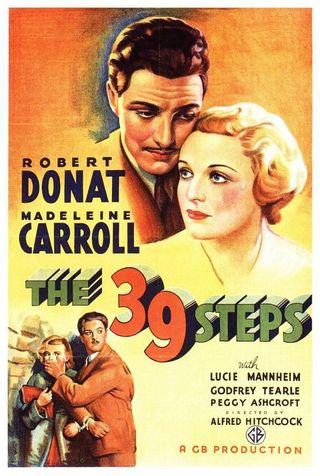
The Thirty Nine Steps by John Buchan.
[Etext - Gutenberg.com]
"'Pardon,' he said, 'I'm a bit rattled tonight. You see, I happen at this moment to be dead.'
I sat down in an armchair and lit my pipe.
'What does it feel like?' I asked. I was pretty certain that I had to deal with a madman.
A smile flickered over his drawn face. 'I'm not mad - yet, say, sir, I've been watching you, and I reckon you're a cool customer. I reckon, too, you're an honest man, and not afraid of playing a bold hand. I'm going to confide in you. I need help worse than any man ever needed it, and I want to know if I can count you in.'
'Get on with your yarn,' I said, 'and I'll tell you.'"
- The Thirty Nine Steps
Former mining engineer Richard Hannay has recently returned to London, after a stint working in Rhodesia. Already he's bored out of his mind:
"In about a week I was tired of seeing sights, and in less than a month I had had enough of restaurants and theatres and race-meetings. I had no real pal to go about with, which probably explains things... Here was I, thirty-seven years old, sound in wind and limb, with enough money to have a good time, yawning my head off all day... I was the best bored man in the UK."
Fortunately for him - well, perhaps not entirely fortunate, as it turns out - a more than exciting event immediately comes his way. Arriving home one evening he is accosted by a man with a desperate look in his eye, a man he recognizes as his upstairs neighbor. Obviously in a panic, he tells Richard someone wants him dead, that he's as good as dead now. If he's not hidden immediately he'll be lost.
Richard lets him in, because he knows of him and he looks like an honest soul. He's also visibly petrified, genuinely terrified of something. This is no act intended to commit a robbery, to get through Richard's door and attack him; one talent Richard has - which is later a great benefit to him - is the ability to recognize a man's general character on their first meeting. It takes a well-trained criminal to fool him.
The man who takes refuge in Richard's apartment, originally hailing from the United States, is Franklin P. Scudder. From the story he tells, Richard learns he's fallen in with the wrong crowd and become embroiled in international intrigue that's way over his head, designed to "... get Russia and Germany at loggerheads" by murdering Greek premier Constantine Karolides on the 15th of June:
"He'll be murdered by an Austrian, and there'll be plenty of evidence to show the connivance of the big folk in Vienna and Berlin."
Sound a little familiar? A little like World War I?
Long story short, Richard allows Franklin to stay in his apartment - safely, he thinks - while he's away a few days. Upon his return, however, he finds Franklin stabbed to death, leaving behind a notebook filled with information, but encrypted in a code Richard cannot de-cipher until much later in the book. That's when he discovers most of the story Franklin told him had been a lie. The murder of Karolides was true but much of the rest had been muddled, in order to throw off anyone who managed to crack the code. Fortunately, our hero Richard Hannay is intelligent man.
The fiends who'd murdered Franklin now know Richard's name and face, and have shifted their focus to him, figuring Franklin told him all. Richard immediately flees to Scotland - to which he's native - taking the first train north. Much of the book consists of an elaborate game of cat and mouse, as Richard tries to stay ahead of his enemies. As it turns out, he's a very resourceful man, quick on his feet and able to disguise himself, mimicking a broad Scottish accent that saves him on more than one occasion.
The near-misses are thrilling, though not as much so as books written in this century. This is partly due to the language, the overly formal diction that rings false to the 21st century ear but would have been more than appropriate in 1915, when it was first serialized in Blackwoods magazine and then published as a book later the same year.
There's no swearing, for one thing, none of the gritty language today's reader would expect from trained spies chasing an innocent man running for his life - a plot convention Buchan was one of the first to create. In Buchan's novel the worst breach of etiquette involves Richard's shirt being dirty and his appearance disheveled. Dirty boots? Dreadful!
But for the time this was exciting stuff. And it still is, actually, once you acclimate to the language. It's impressive what wonderful intuition Richard has, how he's able to dodge his enemies as long as he does: switching identities, navigating unfamiliar territory, etc. All of that's believable, everything reasoned out by an intelligent and resourceful character. Does Buchan collapse the time frame? Well, just a bit. It's hard to believe things happened as quickly as they did and, to tell the truth, a few coincidences are a little much, though certainly no worse than we see in other works, in films, etc., even today. The story even included an "aeroplane" the baddies used to help search the moors, certainly an early usage within a spy novel, the precursor to all the cool gadgets and vehicles 007 went on to employ.
As this is a thriller, I can't really say much more about the actual plot, save to tell you there's a lot of time spent running over moors, finding ridges to duck behind and safe places to hide, or I could spoil the plot. I will give you this, the location of the original 39 steps to which Buchan was referring, though the steps themselves have been repaired and are not the original:

Still, what wonderful atmosphere!
I read this book mostly because John Buchan's name pops up on a lot of "best of" literary read lists as a writer of very early spy thrillers. I enjoy well-written examples of the genre, especially when the plot is set in Britain, written by a Brit (Buchan was a Scot). And, I'll admit, another reason I snuck it in amongst all my other reads is it's a novella, only 100 pages or so, easily finished off in a few " just prior to falling asleep" sessions. It's a quick read; very fast-paced.
The self-denigrating humor sprinkled throughout the book was another positive. It has a few laugh out loud lines, showing Buchan doesn't take himself or the genre too seriously, like this one after Richard jumped from a train, hoping to be unobtrusive but instead making a huge spectacle:
"I could not have made a more public departure if I had left with a bugler and a brass band."
As it turns out, Buchan was a career politician and diplomat, honored with several titles including Governor General of Canada, founding the Governor General Literary Award. He was an amazing man with an unbelievably rich life he chronicles in his autobiography 'Memory Hold-the-Door,' a work I hope to somehow fit into my reading schedule. If you have a chance to read nothing more than his Wikipedia entry, I recommend it. Fascinating stuff and if it doesn't lead you to want to read more about and by the man I'd be surprised.
The Wikipedia entry mentions the character of Richard Hannay pops up in several of Buchan's books, unsurprisingly, because he's a great, fun character with the wealth to leave him loads of free time to pursue spies and such. It's like orphans in children's fiction; the freedom to do whatever, whenever surely helps form the basis of a plot. No pesky work, home or kids to keep him from concentrating.
Buchan had a remarkable imagination and I would definitely read more of his books (many, as was this one, available in free etext via Amazon, Project Gutenberg, etc.). I understand some of them lean toward the gothic. Give me a big, haunted mansion, castle or abbey and a well-written story and I'm a happy, happy gal! Apparently there's a short story collection containing a few of these. I'm definitely going to search them out.
No question, this is a book and author I'd recommend. Buchan's books are just, simply, fun reads. They're not without drawbacks but I think it's all worth it.
The Thirty-Nine Steps was also made into a film on four occasions: 1939, 1959, 1978 and 2008 but from what I read the plot was changed so much I don't feel a desire to watch any of these. Hollywood has a fondness for adding love interests, which the book lacked completely, and I didn't even miss it.

Though, yes, the above adaptation was directed by Alfred Hitchcock. Tempting but with the addition of an extra character who would change the entire feel of the story? Can't do it.
But the book. Back to the book. Read it if you're looking for a short work to fill a gap. Read it if you're interested in the development of the spy/innocent man on the run genre, if you enjoy Scottish moors and wise-cracking rich men. And, if you do and have a chance to, let me know what you think about it. I'd love to hear it.
